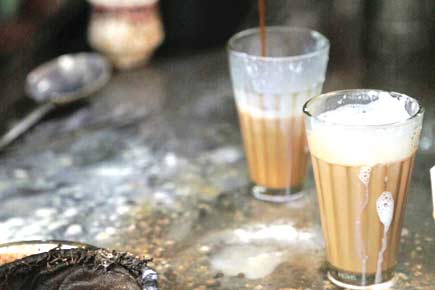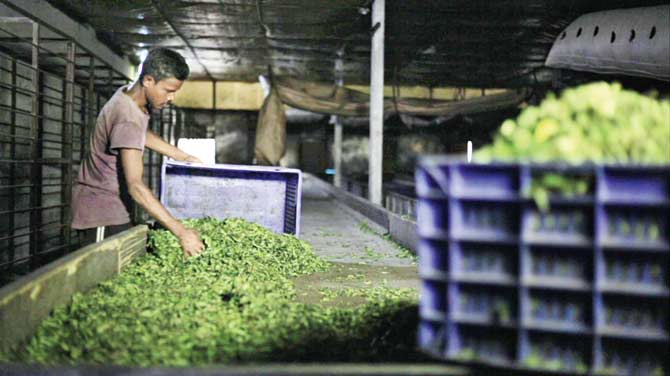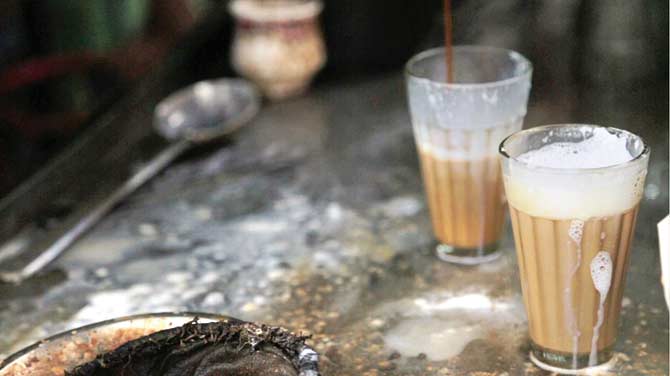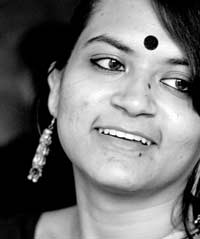A new documentary by a Pune-based filmmaker travels through India to discover how tea divides and unites the nation through a social, cultural and historical narrative

A still from Steeped And Stirred
![]() The camera zooms into a bunch of tea leaves, which writhe to infuse a golden glow into scalding, hot water that caresses them in a glass jar. We hear a cackling stir of a spoon, as the focus shifts to a frail Syed Bilal Yasni, a 90-year-old Hyderabad-based tea aficionado, who perks up, “If you gently stir the mix with a spoon, then those tealeaves which have not opened up will also open, adding more aroma to your tea.” In the next few frames, we witness stained steel containers brewing large cups of milk tea at a quirky-sounding Faltu Tea Centre in Kolkata, tinged with a thick Bengali-accented voiceover of scholar Gautam Bhadra, who informs, “Workers and labourers always prefer Assam (CTC) tea. They don’t get a kick from Darjeeling (leaf) tea. That’s the main difference.”
The camera zooms into a bunch of tea leaves, which writhe to infuse a golden glow into scalding, hot water that caresses them in a glass jar. We hear a cackling stir of a spoon, as the focus shifts to a frail Syed Bilal Yasni, a 90-year-old Hyderabad-based tea aficionado, who perks up, “If you gently stir the mix with a spoon, then those tealeaves which have not opened up will also open, adding more aroma to your tea.” In the next few frames, we witness stained steel containers brewing large cups of milk tea at a quirky-sounding Faltu Tea Centre in Kolkata, tinged with a thick Bengali-accented voiceover of scholar Gautam Bhadra, who informs, “Workers and labourers always prefer Assam (CTC) tea. They don’t get a kick from Darjeeling (leaf) tea. That’s the main difference.”

A worker gathers withered tea leaves to put them into the fermentation section at a tea factory in Rohini near Siliguri, Darjeeling
Far away, in a rustic setting, Ambaben, a resident of Bawla village in Gujarat, fearlessly talks about the discrimination of Dalits at tea stalls and upper caste houses in her mother tongue, which translates as, “I have to use a separate saucer, stored under their thatched roofs and not from the utensils they use. They will make me wash it and pour tea in it from above.”

A still from 'Steeped And Stirred'
In an under-three-minute trailer of Steeped And Stirred, launched last week, documentary filmmaker Shweta Ghosh gives us a glimpse into the diverse narratives behind the century-old practice of tea drinking. Produced by the Public Service Broadcasting Trust (PSBT), the 50-minute documentary has been commissioned for telecast on Doordarshan and post that, it is likely to do the rounds at various film festivals, including PSBT’s annual Open Frame that takes place in September in New Delhi. “My father and I are crazy about tea. I get my love for it from him — he never refuses a cup of tea, no matter when and where you ask him. I wanted to explore something seemingly mundane from a historical, political and social perspective and tea fit right in. In December 2013, I pitched the film to PSBT and they found it interesting enough to fund it as well,” says the 28-year-old Jamshedpur-born, Pune-based filmmaker, who comes armed with an MA in Media and Cultural Studies from TISS and four years of independent filmmaking experience. She has helmed two documentaries previously, including her debut, Accsex, which received a special nod at the National Film Awards 2014.

A tea stall on Bentick Street in Kolkata serves tea from a huge boiler, akin to a large samovar, used to boil the water; (inset) a unique board at the stall with amusing specifications like, No Extra Bhar (Bengali: cup)
Sipping stories
While initially, Ghosh’s plan was to explore multiple ways of tea drinking practices of communities (“Looking at Noon Chai or Salted Tea in Kashmir and trying to see if we can know more about the lives and challenges of the community as well”), her research made her realise that she needed to look at the larger picture. “I chose to focus on ways of drinking tea and the caste, class and gender reading they can have since these are three fundamental ways in which we are divided as a nation. Tea divides and unites us in different ways — sometimes, blatantly [discrimination against Dalits in tea stalls and houses in Gujarat, Tamil Nadu and other states] and subtle ways [what the use of leaf tea vs CTC/dust tea tells us about its affordability]. Tea also has the ability to generate spaces for loitering — as Shilpa Phadke (co-author of Why Loiter) highlights in the film — discussing and forming bonds which are so important to our existence today,” informs Ghosh. As part of research, the filmmaker drowned herself in books related to tea at IHM (Institute of Hotel Management) in Aurangabad, which is supposed to have one of the largest food libraries in India. “A conscious move was not to get too involved in the process of how tea is made from leaf to cup; it has been extensively covered,” she adds.

From Bengal to Bawla
Ghosh (who also did the camerawork, scripting and editing), along with sound recordist Harish Ravichandran, ventured on a 17-day hectic shoot in March last year to film the lush green tea gardens like Rohini Tea Estate and Makaibari near Siliguri in Darjeeling, the buzzing coffee houses of Kolkata and Trivandrum, the bustling Irani cafés of Mumbai and Hyderabad along with tea estates in New Delhi. “I also shot with innumerable people of various backgrounds, on roads, trains, parks, tea stalls and cafés to just get an idea of how people like their tea,” informs the filmmaker, who also visited Pune and Bawla village near Ahmedabad during the course of the shoot. “A two-member crew made it easier to look unassuming on the streets when interviewing people or talking to those who are conscious on camera. However, it was challenging to handle the equipment on such a long trip. We also faced unexpected duress, like the day we were to shoot in Trivandrum, there was a citywide strike and incessant rain. Some of the processes at the tea factory were not possible to shoot since there were seasonal changes in production schedules between November (recce) and March (shoot),” says Ghosh, who took over five months to concise the footage into a 50-minute film.
Using the backdrop of a tea factory, the film establishes the history of drinking tea, while the filmmaker paints a visual narrative of ‘classification’ along caste/class lines through the tea sorting process. The docu also offers a glimpse into interesting tea centres and posters from across India, like a tea stall on Bentick Street in Kolkata that serves tea from a huge boiler à la a Persian samovar or a huge hoarding of Lasa Lamsa Mix that is juxtaposed against Charminar in Hyderabad. “I saw this board at a lot of traffic junctions and on asking around, was told that they are one of the many dealers of tea in Hyderabad. They surely make their presence felt to an outsider in old Hyderabad,” she sums up.
To watch trailer log on to: www.youtube.com/watch?v=Uauii0CzHZI
 Subscribe today by clicking the link and stay updated with the latest news!" Click here!
Subscribe today by clicking the link and stay updated with the latest news!" Click here!









